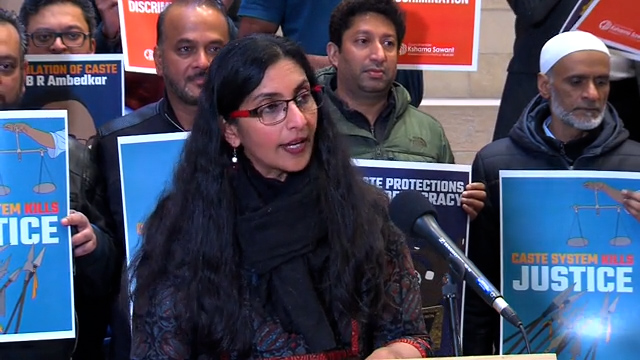Seattle considers historic law barring caste discrimination

 Indian American Council member Kshama Sawant says her legislation doesn’t single out one community
Indian American Council member Kshama Sawant says her legislation doesn’t single out one community
The Seattle City Council is set to consider Indian American Council member Kshama Sawant’s proposed ordinance to add caste to Seattle’s anti-discrimination laws. If the council approves it Tuesday, Seattle will become the first US city to specifically outlaw caste discrimination.
Mumbai born lone socialist member Sawant’s legislation will prohibit businesses from discriminating based on caste with respect to hiring, tenure, promotion, workplace conditions, or wages.
Read: Kshama Sawant introduces first law to ban caste discrimination (January 25, 2023)
It will ban discrimination based on caste in places of public accommodation, such as hotels, public transportation, public restrooms, or retail establishments.
The law will also prohibit housing discrimination based on caste in rental housing leases, property sales, and mortgage loans, according to Sawant.
“Caste discrimination doesn’t only take place in other countries. It is faced by South Asian American and other immigrant working people in their workplaces, including in the tech sector, in Seattle and in cities around the country,” Sawant stated introducing the legislation last month.
“That’s why my office is proud to bring forward first-in-the-nation legislation for our city to ban caste-based discrimination, in solidarity with our South Asian and other immigrant community members, and all working people,” she stated.
“With over 167,000 people from South Asia living in Washington, largely concentrated in the Greater Seattle area, the region must address caste discrimination, and not allow it to remain invisible and unaddressed,” Sawant added.
The US caste debate has divided the South Asian community, according to an AP report. It cited Dalit activists as saying caste discrimination is prevalent in diaspora communities, surfacing in social relations, housing, education and the tech sector.
The United States is the second most popular destination for Indians living abroad, according to the Migration Policy Institute, which estimates the US diaspora grew from about 206,000 in 1980 to about 2.7 million in 2021.
Read: Kshama Sawant to launch ‘Workers Strike Back’ movement (January 23, 2023)
The group South Asian Americans Leading Together says nearly 5.4 million South Asians live in the US — up from 3.5 million counted in the 2010 census. Most trace their roots to Bangladesh, Bhutan, India, Nepal, Pakistan and Sri Lanka.
There has been strong pushback to anti-discrimination laws and policies that target caste from some groups, according to the AP report. They say it will hurt a community that already faces discrimination.
But over the past decade, Dalit activism has garnered support from parts of the diaspora and more Dalits are telling their stories, energizing this movement, it said.
According to a survey of 1,500 South Asians in the US by Equality Labs cited by AP 67% of Dalits who responded reported being treated unfairly at their workplace because of their caste and 40% of Dalit students who were surveyed reported facing discrimination in educational institutions compared to 3% of upper-caste respondents.
Also, 40% of Dalit respondents said they felt unwelcome at their place of worship due to caste.
The Dalit American community is not monolithic, AP noted. Aldrin Deepak, an India-born Dalit living near San Francisco, was quoted as saying he has never faced caste discrimination during 35 years in the US.
He has decorated local Hindu temple deities and hosted community members for Diwali celebrations. “Making an issue where there is none is only creating more fractures in our community,” he said.
Nikunj Trivedi, the Coalition of Hindus of North America president, views the narrative around caste as “completely twisted.”
“The understanding of Hinduism is poor in this country,” Trivedi was quoted as saying. “Many people believe caste equals Hinduism, which is simply not true. There is diversity of thought, belief and practice within Hinduism.”
Trivedi said Seattle’s proposed policy is dangerous because it is based on anecdotal reports, not reliable data. He suggests it would be difficult to verify someone’s caste.
Suhag Shukla, the Hindu American Foundation executive director, called Seattle’s proposed ordinance unconstitutional because it targets an ethnic minority and “sends that message that we are an inherently bigoted community that must be monitored.”
Read: Seattle City Council considers historic law barring caste discrimination (February 20, 2023)
Nikhil Mandalaparthy, deputy executive director of Hindus for Human Rights, disagrees, according to AP. His Washington, DC-based group supports the proposed ordinance. A United Nations report in 2016 said at least 250 million people worldwide still face caste discrimination, which surfaces in various religions.
“We want South Asians to have similar access to opportunities and not face discrimination,” he was quoted as saying. “Sometimes that means airing the dirty laundry of the community in public.”
Sawant said current anti-discrimination laws are insufficient and her legislation doesn’t single out one community.


1 Comment
Need stop all immigrants who want to follow sanadhana dharma or Brahminism.
Need to send back all useless brahmin purohits to India where they belong to